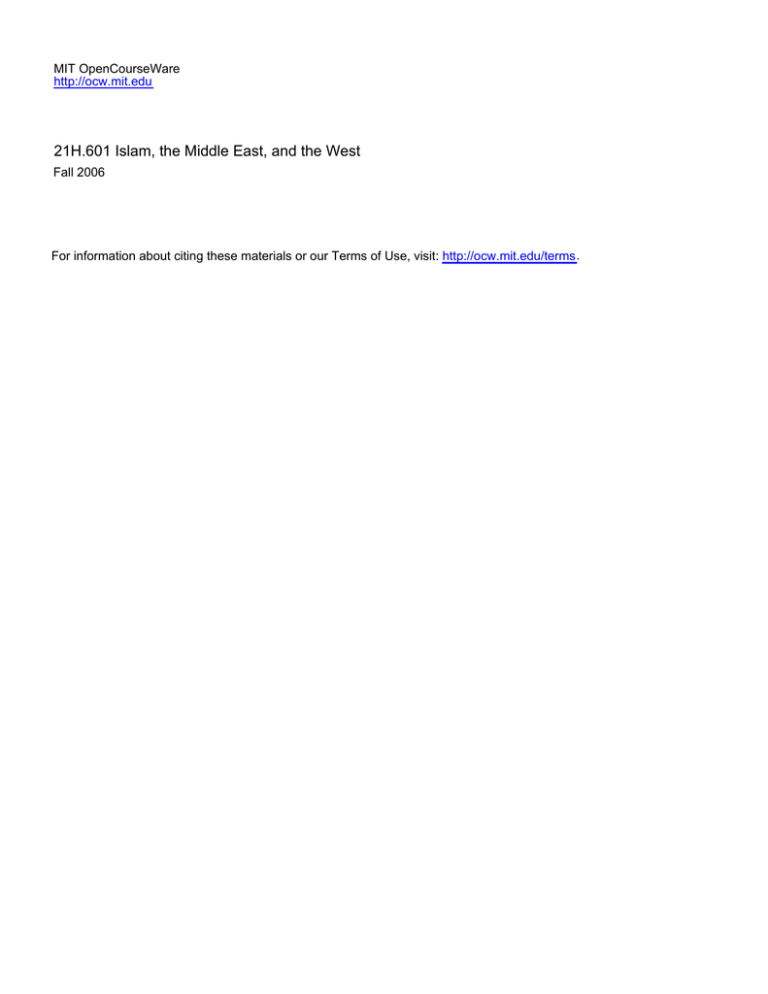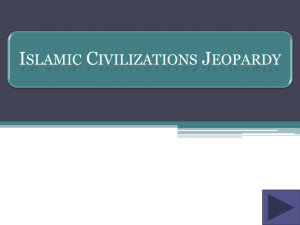21H.601 Islam, the Middle East, and the West MIT OpenCourseWare Fall 2006
advertisement

MIT OpenCourseWare http://ocw.mit.edu 21H.601 Islam, the Middle East, and the West Fall 2006 For information about citing these materials or our Terms of Use, visit: http://ocw.mit.edu/terms. Massachusetts Institute of Technology Faculty of History 21H.601 HASS-D Islam, the Middle East, and the West Fall 2009 Prof. Bedross Der Matossian Course Description The aim of the course is to provide students with a general overview of the basic themes and issues in Middle Eastern history from the rise of Islam until the 21st century. This will be done with an emphasis on the encounters and exchanges between what became known as the “Middle East” and the “West”. The course will begin with an in-depth examination of the first period of Islam which stretched from the 7th century to the end of the Abbasid Caliphate and the rise of the Mongols in world history. This will cover the emergence of Islam as a new religion, the Arab conquest and the formation of an Empire, the Christanization of Europe, and will conclude with the crusades. The second part of the course will examine the period between the 13th and the 17th centuries. This period is characterized by the height of Ottoman territorial expansion, the rise of the Safavid and the Mughal Empires, the flourishing of Northern European powers, European ventures into Asia, and the conquest of the Americas. These all redefined the physical and the intellectual boundaries of both geographic regions. This will be followed by an analysis of European economic and political intervention into Middle Eastern societies, which ultimately led to the colonization of these societies. The last section of the course will deal with Middle Eastern responses to Western hegemony and will discuss the main social, economic, and political developments in the Middle East during the 20th century. This includes debates on democracy, women rights, and the Middle East post-September 11. Required Readings: You should acquire the texts listed below. Other required readings are available through electronic reserve or online. • John Esposito, ed., The Oxford History of Islam (New York: Oxford University Press, 1999) [OHI] • Robinson Francis, ed., The Cambridge Illustrated History of the Islamic World (Cambridge: Cambridge University Press, 2005) CHIW • Franco Cardini, Europe and Islam (Wiley-Blackwell, 2001) • Maalouf, Amin. The Crusades Through Arab Eyes. New York, NY: Schoken, 1985. ISBN: 9780805240047. Course Organization The format of the class will be lectures on Mondays and Wednesdays, and discussion sessions on Fridays. The regular class meetings will be composed of lecture, question and answer and brief discussion of the material. The discussion section on Fridays will address the material covered on Mondays and Wednesdays. Therefore the discussion session will be a very important part of the course as is reflected in the breakdown of the final grade as follows: Class Participation: 20% Reaction Papers: 10% Short Essay: 15% Final Essay: 25% Final Exam: 25% One Map Quizz: 5% Oral Participation in Class: All students must demonstrate that they have read and critically analyzed the material in preparation for lectures and class discussions. Essays: In addition to the discussion session, the criteria for HASS-D subjects include twenty pages of written assignments during the semester. The written assignments will be divided into 1) a 10-page final essay, 2) a 5-page short essay, and 3) 5 reaction papers. Each reaction paper is one page. These papers will be based on readings, lectures, discussion, and movies over the course of the class. There will be no need for additional outside research. The long essay is due at the end of the course whereas the short essay is due on the 20th of October. Final Examination: The final exam will take place during finals’ week and will encompass the entire semester’s work. The final exam will include a map, key terms, short essays, and a long essay question. All of the sections mentioned in the final exam will have some element of choice. Academic Honesty: The work that you submit for this class must be your own work. Plagiarism of any kind will not be tolerated under any circumstances and will result in an immediate “F” grade for the course. In addition, all such cases will be immediately directed to the Committee of Discipline. Any words and ideas that are not yours should be accompanied by full and complete citation. If you have any further questions dealing with academic honesty you must contact the professor prior to the submission of any written assignment. Class Outline: Week I- Sep. 10. Introduction and Overview: Where is the Middle East and Why we Study the Middle East? Roderic H. Davison, “Where is the Middle East?” Foreign Affairs, Vol. 38, p. 665 -675. July 1960. http://heinonline.org/HOL/Page?handle=hein.journals/fora38&id=675&collection=journals Lisa Anderson, “Scholarship, Policy, Debate and Conflict: Why We Study the Middle East and Why It Matters,” Middle East Studies Association Bulletin, Vol. 38, No. 1 (Summer 2004) http://fp.arizona.edu/mesassoc/Bulletin/Pres%20Addresses/Anderson.htm Lockman, Zachary. "In the Beginning." In Contending Visions of the Middle East. New York, NY: Cambridge University Press, 2004, pp. 7-37. ISBN: 9780521629379. "The West's Problem with the East." In The East in the West. New York, NY: Cambridge University Press, 1996, pp. 1-10. ISBN: 9780521556736. Week II-Sep. 15, 17. The Islamic Civilization “The Islamic Vision in Religion and Civilization,” in Hodgson, Marshall G. S: The venture of Islam [electronic resource]: conscience and history in a world Civilization. Vol.I, pp.71-99. Origins of Islam in Arabia and the Prophet Muhammad • Introduction & Pre-Islamic Arabia • Islam, the Prophet and his Community Hodgson, Marshall G.S. “The World Before Islam” [VI].pp.103-146 Ibn al-Kalbi, Book of Idols, read Manah, Allat, Al-‘Uzza. http://answeringislam.org/Books/Al-Kalbi/ Week III-Sept. 22, 24Islam: Belief and Practice, Law and Society Vincent J. Cornell, “Fruit of the Tree of Knowledge: The Relationship between Faith and Practice in Islam” OHI. Mohammad Hashim Kamali, “Law and Society: The interplay of Revelation and Reason in the Shariah” in OHI. Basim Musallam, “The Ordering of Muslim Socieites,” in CHIW Robert Irwin, “The Emergence of the Islamic World System 1000-1500,” in CHIW Zamakhshari (1070-1143 CE): The Discoverer of Truth, c. 1130 CE http://www.fordham.edu/halsall/source/1130Zamakhshari.html Islam: Society, Economy, and Science K.N. Chandhuri, “The Economy in Muslim Societies,” in CHIW Ch.4: Ahmad Dallal, “Science, Medicine, and Technology: The Making of a Scientific Culture,” 155-214. OHI Francis Robinson, “Knowledge, its Transmission, and the Making of Muslim Societies,” in CHIW Week IV-Sept. 29, Oct. 1. Arab Conquests, Caliphate, and the Formation of Empire and Society Fred Donner “Muhammad and the Caliphate: Political History of the Islamic Empire Up to the Mongol Conquest” OHI Robert Irwin, “The Emergence of the Islamic World System 1000-1500,” in CHIW Expansion of Islam to Europe: The case of Andalusia Goody, Jack. "Introduction," and "Past Encounters." In Islam in Europe. pp. 10-24 Guichard, Pierre. "The Social History of Muslim Spain." In The Legacy of Muslim Spain. Edited by Salma Khadra Jayyusi. New York, NY: E.J. Brill, 1992, pp. 679-708. ISBN: 9789004095991. Maalouf, Amin. The Crusades Through Arab Eyes. pp. 82-158. Week V-Oct. 6, 8. In the name of Liberating the Holy Land: Crusades enter Islamdom 3. Ibn Munqidh: http://www.fordham.edu/halsall/source/usamah2.html 4. A Christian/Muslim debate of the 12th Century: http://www.fordham.edu/halsall/source/christ-muslim-debate.html 5. Amin Maalouf, The Crusades through Arab Eyes [read in whole but focus on pp. xiii55, 82-96, and 176-217] Movie: The Kingdom of Heaven Week VI- Oct. 13, 15. The Mongols Ibn al-Athir on Mongols in Iran: http://www.fordham.edu/halsall/source/1220al-Athir-mongols.html John I. Smith, “Islam and Christendom: Historical, Cultural, and Religious interaction from the Seventh to the Fifteenth centuries” in OHI.pp.305-346. Hodgson, Marshall, “After the Mongol Irruption: Politics and Society, 1259-1405, VOL.II. pp. 386-436.VI Movie: PBS documentary Week VII- Oct. 20, 22. First Paper is due on October the 20th. The Formation of the Ottoman Empire and expansion to the West Ch.8: Ira M. Lapidus, “Sultanates and Gunpowder Empires: The Middle East,” 347-394. OHI Robert Irwin, “The Emergence of the Islamic World System 1000-1500,” in CHIW Movie: Sulayman the Magnificent Week VIII-Oct. 27, 29. The Middle East in the Age of Napoleon's Invasion Ayalon, David. "The Historian al-Jabarti and his Background." Bulletin of the School of Oriental and African Studies, University of London 23, no. 2. (1960): 217-249. 16 Al-Jabarti, Sheik. Napoleon in Egypt: Al-Jabarti's Chronicle of the French Occupation, 1798. Translated by Schmuel Moreh. Princeton, NJ: Markus Wiener Publishing, Inc., 1993. Selection (13 pages). ISBN: 9781558760707. Week IX-Nov. 3, 5. Islam and the Middle East in European Thought Hourani, Albert. "Islam in European Thought." In Islam in European Thought. New York, NY: Cambridge University Press, 1991, pp. 32-60 (sections 6 to 11). Said, Edward. Orientalism. New York, NY: Pantheon Books, 1978, pp. 1-9, 31-49. ISBN: 9780394428147. Film: Anderson, Alexandra, and Tariq Ali. A Conversation with Edward Said. 1994. 20 Week X-Nov. 10, 12. The Middle East in the Age of Colonialism and Nationalism Ch.13: S. V. R. Nasr, “European Colonialism and the Emergence of Modern Muslim States,” 549-600. OHI Stephen Dale, “The Islamic World in the Age of European Expansion 1500-1800,” in CHIW Sarah Ansari, “The Islamic World in the Era of Domination 1800 to the Present” in CHIW XI- Nov. 17, 19. The Ottoman Empire in the Age of Reform and European Challenges Sarah Ansari, “The Islamic World in the Era of Western Domination: 1800 to the Present,” in CHIW Francis Robinson, “Knowledge, its Transmission, and the Making of Muslim Societies,” in CHIW Hodgson, Marshall, “Modernism in Turkey: Westernization,” in The Venture of Islam, Vol.III, pp. 249-271. Kemal, Mustafa. Excerpt from his Speech From Resistance to Independence “The Drive for Independence: The Twentieth Century,” The Venture of Islam, Vol.III, pp. 357-409. Sarah Ansari, “The Islamic World in the Era of Western Domination: 1800 to the Present,” in CHIW Jankowski, James. "Arab Nationalism in 'Nasserism' and Egyptian State Policy, 19521958." In Rethinking Nationalism in the Arab Middle East. Edited by J. Jankowski and I. Gershoni. New York, NY: Columbia University Press, 1997, pp. 150-167. ISBN: 9780231106955. Fadel, Mohamed. Nasser 56. Egypt, 1996. XII- Nov. 24, 26- NOTE- Nov. 26 Thanksgiving day Islamic Revolution, Terrorism, and Us John L. Esposito, “Contemporary Islam: Reformation or Revolution?” in OHI. 31 Mirsepassi-Ashtiani, Ali. "The Crisis of Secular Politics and the Rise of Political Islam in Iran." Social Text 38 (Spring 1994): 51-84. 32 Russet, Bruce, John Oneal, and Michaelene Cox, "Clash of Civilizations, or Realism and Liberalism Déjà vu? Some Evidence." Journal of Peace and Research 37, no. 5 (September 2000): 583-608. Abrahamian, Ervand. "The U.S. Media, Huntington and September 11." Middle East Report 223 (Summer 2002): 62-63. Optional reading as reference to his ideas: Huntington, Samuel P. "The Clash of Civilizations." Foreign Affairs 72, no. 3 (Summer 1993). XII-Dec. 1, 3, Globalization of Islam Yvonne Yazbeck Haddad, “The Globalization of Islam: The Return of Muslims to the West,” 601-642 OHI Covering Islam in the West in the 20th century Edward Said, Covering Islam. Selected sections FINAL PAPER DUE MONDAY 8th of December, 2008 XII- Dec. 8, 10. Review Sessions FINAL EXAM



